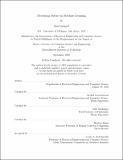Measuring justice in machine learning
Author(s)
Lundgard, Alan.
Download1241248031-MIT.pdf (596.6Kb)
Other Contributors
Massachusetts Institute of Technology. Department of Electrical Engineering and Computer Science.
Advisor
Arvind Satyanarayan and Sally Haslanger.
Terms of use
Metadata
Show full item recordAbstract
How can we build more just machine learning systems? To answer this question, we need to know both what justice is and how to tell whether one system is more or less just than another. That is, we need both a definition and a measure of justice. Theories of distributive justice hold that justice can be measured (in part) in terms of the fair distribution of benefits and burdens across people in society. Recently, the field known as fair machine learning has turned to John Rawls's theory of distributive justice for inspiration and operationalization. However, philosophers known as capability theorists have long argued that Rawls's theory uses the wrong measure of justice, thereby encoding biases against people with disabilities. If these theorists are right, is it possible to operationalize Rawls's theory in machine learning systems without also encoding its biases? In this paper, I draw on examples from fair machine learning to suggest that the answer to this question is no: the capability theorists' arguments against Rawls's theory carry over into machine learning systems. But capability theorists don't only argue that Rawls's theory uses the wrong measure, they also offer an alternative measure. Which measure of justice is right? And has fair machine learning been using the wrong one?
Description
Thesis: S.M., Massachusetts Institute of Technology, Department of Electrical Engineering and Computer Science, September, 2020 "September 2020." Cataloged from student-submitted PDF version of thesis. Includes bibliographical references (pages 29-36).
Date issued
2020Department
Massachusetts Institute of Technology. Department of Electrical Engineering and Computer SciencePublisher
Massachusetts Institute of Technology
Keywords
Electrical Engineering and Computer Science.